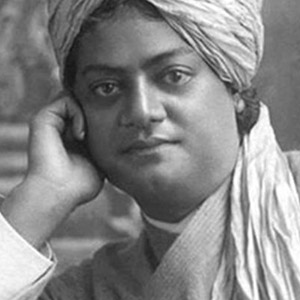
Vivekananda (1863 – 1902) was an Indian Hindu monk, a chief disciple of the 19th-century Indian mystic Ramakrishna. He was a key figure in the introduction of the Indian philosophies of Vedanta and Yoga to the Western world and is credited with raising interfaith awareness, bringing Hinduism to the status of a major world religion during the late 19th century. He was a major force in the revival of Hinduism in India. He first introduced Hinduism at the Parliament of the World’s Religions in Chicago in 1893, and over his lifetime conducted hundreds of public and private lectures and classes, disseminating tenets of Hindu philosophy in the United States, England and Europe.

Quotes by Vivekananda…
One ounce of the practice of righteousness and of spiritual self-realization outweighs tons and tons of frothy talk and nonsensical sentiments. Show us one, but one, gigantic spiritual genius growing out of all this dry dust of ignorance and fanaticism… open the windows of your hearts to the clear light of truth, and sit like children at the feet of those who know what they are talking about… Let us then listen attentively to what they say.
Those who come to seek truth with such a spirit of love and veneration, to them the Lord of Truth reveals the most wonderful things regarding Truth, Goodness, and Beauty.
Ramakrishna used to tell a story of some men who went into a mango orchard and busied themselves in counting the leaves, the twigs, and the branches, examining their colour, comparing their size, and noting down everything most carefully, and then got up a learned discussion on each of these topics… But one of them, more sensible than the others, did not care for all these things, and instead thereof, began to eat the mango fruit. And was he not wise? So leave the counting of leave and twigs and this note taking to others… You can never once see a strong spiritual man among these “leaf-counters.”
As to the thirst after knowledge, it is an old law that we all get whatever we want. None of us can get anything other than what we fix our hearts upon… The success sometimes may come immediately, but we must be ready to wait patiently even for what may look like an infinite length of time. The student who sets out with such a spirit of perseverance will surely find success and realization at last.
What frightens you? Stand then and be free. If the sun comes down, the moons crumbles into dust, systems after systems are hurled into annihilation, what is that to you? Stand as a rock; you are indestructible… so break this chain and be free forever. What frightens you, what holds you down? It is only ignorance and delusion; nothing else can bind you… Therefore, if you dare, stand on that.
There is an old simile in India that if you place a cup of milk before a Raja Hamsa (swan) with plenty of water in it, he will take all the milk and leave the water. In that way we should take what is of value in knowledge, and leave the dross.
When a farmer is irrigating his field the water is already in the canals, only there are gates which keep the water in. The farmer opens these gates, and the water flows in by itself, by the law of gravitation. So, all human progress and power are already in everything; this perfection is every man’s nature, only it is barred in and prevented from taking its proper course. If anyone can take the bar off, in rushes nature. Then the man attains the powers which are his already.
Never say any man is hopeless, because he only represents a character, a bundle of habits, and these can be checked by new and better ones.
The central secret is, therefore, to know that the various passions and feelings and emotions in the human heart are not wrong in themselves; only they have to be carefully controlled and given a higher and higher direction, until they attain the very highest condition of excellence.
When, by analyzing his own mind, man comes face to face, as it were, with something which is never destroyed, something which is, by its own nature, eternally pure and perfect, he will no more be miserable, no more unhappy. All misery comes from fear, from unsatisfied desire… When he knows that he is perfect, he will have no more vain desires, and both these causes being absent, there will be no more misery — there will be perfect bliss, even while in this body.

